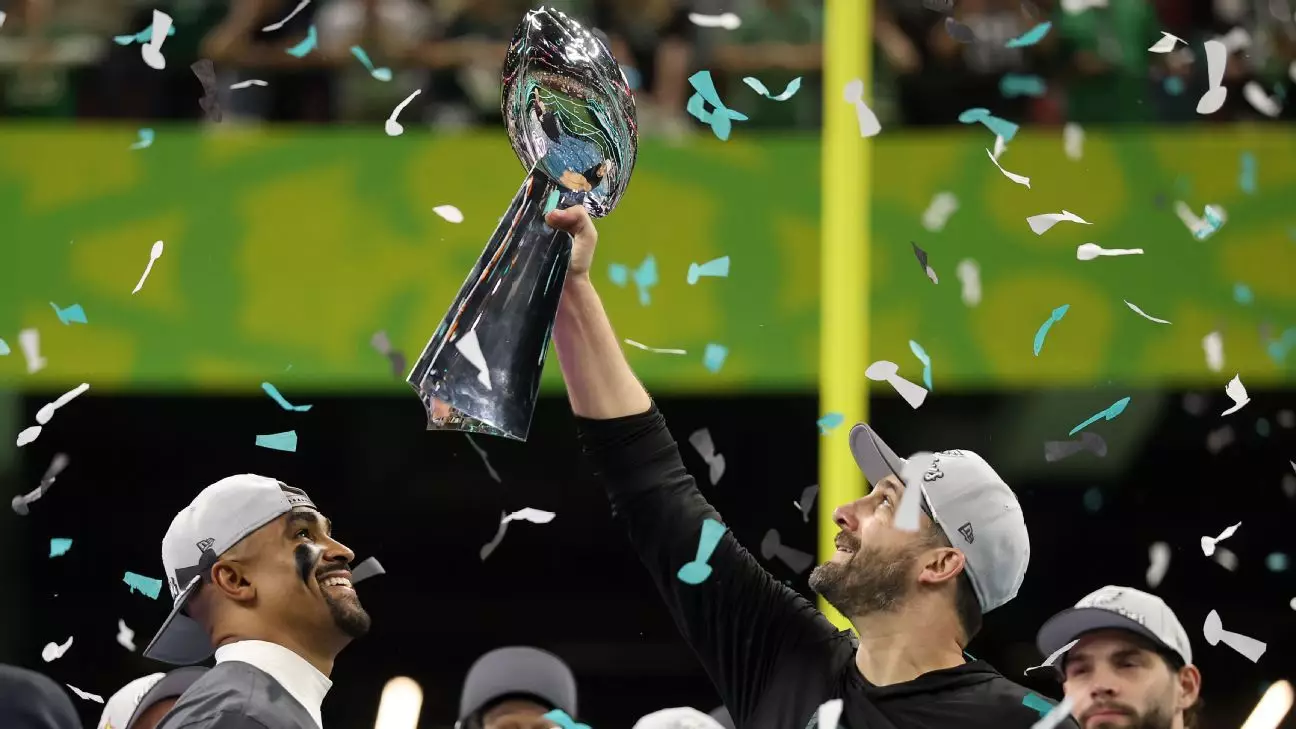The Philadelphia Eagles have taken a significant step in their coaching structure by promoting Kevin Patullo to the role of offensive coordinator. This decision follows the departure of Kellen Moore, who has transitioned to his new position as head coach of the New Orleans Saints after Philadelphia’s Super Bowl LVIX victory. Patullo’s promotion not only signals a potential shift in the offensive dynamics for the Eagles but also brings into question the implications associated with continuity and familiarity in coaching staff, especially concerning quarterback Jalen Hurts’ development.
Hiring from within the organization has always been a double-edged sword, presenting a mix of opportunities and risks. By promoting Patullo, who previously served as the passing game coordinator and has a longstanding relationship with head coach Nick Sirianni, the Eagles are banking on established communication and an inherent understanding of the team’s culture. This continuity can benefit the Eagles, especially since Patullo has been part of Sirianni’s vision since their time together at the Indianapolis Colts.
Sirianni’s confidence in Patullo is evident; he have remarked on the integral role Patullo has played in their recent successes. This indicates that the continuity they have cultivated over the years may create a more streamlined approach to offensive play-calling, ultimately benefitting the players as they adapt to new schemes.
Yet, the question remains: will Patullo’s promotion yield the desired results? Historical evidence shows that similar transitions within organizations do not always equate to success on the field. The previous promotion of Brian Johnson as offensive coordinator served as a cautionary tale, as his partnership with Sirianni and Hurts did not produce cohesiveness, leading to a falter in offensive identity.
As the Eagles embark on a new chapter with Patullo, it highlights a critical consideration for star quarterback Jalen Hurts: the need for consistent leadership and approach. Hurts has experienced a revolving door of offensive strategies since entering the league, now facing his fifth offensive coordinator in just four seasons. This lack of stability can disrupt a quarterback’s development and the overall cohesion of an offense.
Despite the changes, Hurts appears to recognize the nuances surrounding a head coach’s decisions. His comments regarding Patullo exude a level of faith in his capabilities. However, it is concerning that Hurts feels that his role in determining the structure and strategy of the team is limited. The instability of play-call structures could impose unnecessary pressure on Hurts as he strives to adapt to different schemes while maintaining his performance levels.
Nonetheless, the relationship that Patullo and Hurts have fostered should provide a sense of familiarity that can aid in creating a synergy on the field. Patullo’s historical involvement in developing the passing game offers some assurance that their collaboration could bear fruit.
While presenting optimism, the Eagles must reflect on the challenges they faced in their previous season. A less-than-ideal collaboration following Johnson’s promotion ultimately contributed to underperformance during critical moments in the season. The Eagles shifted their strategic approach mid-season under Moore, and while it sparked temporary success through a formidable running game, the adaptations proved insufficient in maintaining consistent offensive identity.
Transitioning to yet another coordinator puts additional scrutiny on Sirianni to ensure alignment among the coaching staff. Just as important as Patullo’s promotion is the cohesive playing philosophy that must emerge from this new hierarchy. The Eagles need an offensive identity that balances run and pass effectively while maximally utilizing the talents of players, particularly Hurts, to ensure they can capitalize on their strengths.
Kevin Patullo’s promotion as offensive coordinator for the Philadelphia Eagles signals a desire for continuity in the face of change, underscoring the criticality of consistency in developing a championship-caliber team. As the Eagles look to leverage the familiarity between Patullo and their quarterback, the success of this new strategy hangs in a delicate balance. The past season’s lessons must inform their forward strategy, creating a vision that aligns the coaching staff with players for sustained momentum. Ultimately, the Eagles must seek to forge an identity that defines them while empowering their players to reach their fullest potential.


Napsat komentář